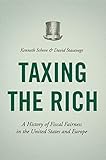Taxing the Rich : A History of Fiscal Fairness in the United States and Europe / David Stasavage, Kenneth Scheve.
Material type: TextPublisher: Princeton, NJ : Princeton University Press, [2016]Copyright date: ©2018Description: 1 online resource (288 p.) : 20 b/w illus., 3 tablesContent type:
TextPublisher: Princeton, NJ : Princeton University Press, [2016]Copyright date: ©2018Description: 1 online resource (288 p.) : 20 b/w illus., 3 tablesContent type: - 9780691178295
- 9781400880379
- Income tax
- Rich people -- Taxation -- Great Britain
- Rich people -- Taxation -- United States
- Wealth -- Great Britain
- Wealth -- United States
- POLITICAL SCIENCE / Public Policy / Social Services & Welfare
- Ability To Pay
- At Best
- Bond (finance)
- Capital levy
- Conscription
- Consideration
- Consumption tax
- Corporate tax
- Debt
- Direct tax
- Economic efficiency
- Economic growth
- Economic inequality
- Economic interventionism
- Economic policy
- Economics
- Economist
- Economy
- Emmanuel Saez
- Employment
- Equality of outcome
- Estate tax in the United States
- Excise Tax
- Expense
- Finance
- Financial crisis
- Flat tax
- Funding
- Gift tax
- Globalization
- Government revenue
- Gross domestic product
- Incentive
- Income distribution
- Income tax in the United States
- Income tax
- Income
- Indirect tax
- Inflation
- Inheritance tax
- Institution
- Jean Tirole
- John Stuart Mill
- Legislation
- Legislature
- Luxury goods
- Mass mobilization
- Middle class
- Oligarchy
- On War
- Payroll tax
- Pension
- People's Budget
- Percentage point
- Percentage
- Political economy
- Political party
- Political science
- Political spectrum
- Politics
- Progressive tax
- Property tax
- Provision (accounting)
- Public finance
- Quarterly Journal of Economics
- Rates (tax)
- Redistribution of income and wealth
- Sacrifice
- Salary
- Self-interest
- Stanford University
- Suffrage
- Tariff
- Tax Fairness
- Tax Schedule
- Tax deduction
- Tax incidence
- Tax law
- Tax policy
- Tax rate
- Tax revenue
- Tax
- Taxation in the United Kingdom
- Taxation in the United States
- Taxpayer
- Technology
- Thomas Piketty
- Total revenue
- Universal suffrage
- University of Amsterdam
- War effort
- War reparations
- War
- Warfare
- Wealth tax
- Wealth
- Welfare state
- Welfare
- World War I
- World War II
- online - DeGruyter
| Item type | Current library | Call number | URL | Status | Notes | Barcode | |
|---|---|---|---|---|---|---|---|
 eBook
eBook
|
Biblioteca "Angelicum" Pont. Univ. S.Tommaso d'Aquino Nuvola online | online - DeGruyter (Browse shelf(Opens below)) | Online access | Not for loan (Accesso limitato) | Accesso per gli utenti autorizzati / Access for authorized users | (dgr)9781400880379 |
Browsing Biblioteca "Angelicum" Pont. Univ. S.Tommaso d'Aquino shelves, Shelving location: Nuvola online Close shelf browser (Hides shelf browser)

|

|

|

|

|

|

|
||
| online - DeGruyter Living on Paper : Letters from Iris Murdoch, 1934-1995 / | online - DeGruyter Unequal Gains : American Growth and Inequality since 1700 / | online - DeGruyter Trouble in the Tribe : The American Jewish Conflict over Israel / | online - DeGruyter Taxing the Rich : A History of Fiscal Fairness in the United States and Europe / | online - DeGruyter How to Grow Old : Ancient Wisdom for the Second Half of Life / | online - DeGruyter How to Choose a Leader : Machiavelli's Advice to Citizens / | online - DeGruyter The Rise of a Prairie Statesman : The Life and Times of George McGovern / |
Frontmatter -- Contents -- Figures and Tables -- Acknowledgments -- Part One. Debating Taxation -- 1. Why Might Governments Tax the Rich? -- 2. Treating Citizens as Equals -- Part Two. When Have Governments Taxed The Rich ? -- 3. The Income Tax over Two Centuries -- 4. Taxing Inheritance -- 5. Taxes on the Rich in Context -- Part Three. Why Have Governments Taxed The Rich ? -- 6. The Conscription of Wealth -- 7. The Role of War Technology -- 8. Why Taxes on the Rich Declined -- 9. What Future for Taxing the Rich? -- Notes -- References -- Index
restricted access online access with authorization star
http://purl.org/coar/access_right/c_16ec
In today's social climate of acknowledged and growing inequality, why are there not greater efforts to tax the rich? In this wide-ranging and provocative book, Kenneth Scheve and David Stasavage ask when and why countries tax their wealthiest citizens—and their answers may surprise you.Taxing the Rich draws on unparalleled evidence from twenty countries over the last two centuries to provide the broadest and most in-depth history of progressive taxation available. Scheve and Stasavage explore the intellectual and political debates surrounding the taxation of the wealthy while also providing the most detailed examination to date of when taxes have been levied against the rich and when they haven't. Fairness in debates about taxing the rich has depended on different views of what it means to treat people as equals and whether taxing the rich advances or undermines this norm. Scheve and Stasavage argue that governments don't tax the rich just because inequality is high or rising—they do it when people believe that such taxes compensate for the state unfairly privileging the wealthy. Progressive taxation saw its heyday in the twentieth century, when compensatory arguments for taxing the rich focused on unequal sacrifice in mass warfare. Today, as technology gives rise to wars of more limited mobilization, such arguments are no longer persuasive.Taxing the Rich shows how the future of tax reform will depend on whether political and economic conditions allow for new compensatory arguments to be made.
Mode of access: Internet via World Wide Web.
In English.
Description based on online resource; title from PDF title page (publisher's Web site, viewed 01. Dez 2022)


